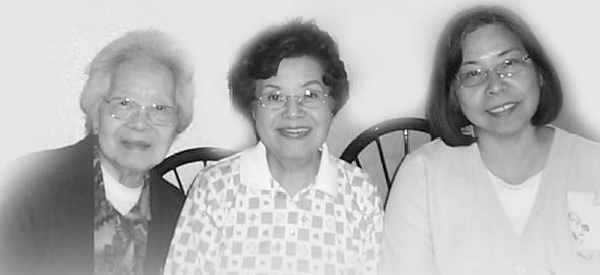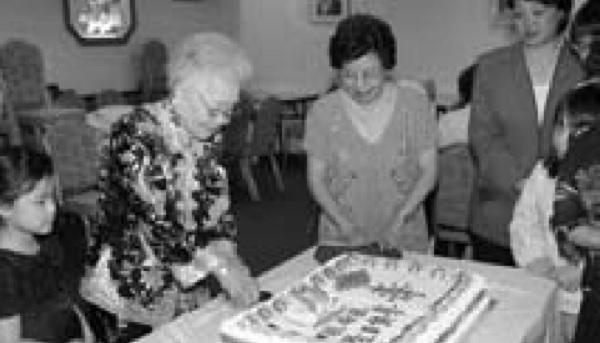car clothing style
Translation/Zhang Lichun

▲The author (right), eldest sister (middle) and mother all experienced their years as female workers in a garment factory and left a legacy of diligence to their descendants.
Mom said I have to go! She said that the boss wanted to find a better translator than her sister. If I would speak English, he promised to pay me six dollars an hour. Besides, my sister spent a lot of effort to get this job for me. Moreover, my mother and her colleague, an old Italian lady, have been relying on gestures to communicate with each other for many years. They also need my help to have a real conversation. "chat".
In this way, I, a college student, couldn't help but spend the entire summer of 1973 in the clothing factory in Boston's Chinatown.
Bustling excitement
In the entire factory, except for three male workers in the ironing room who seemed to be quite unlucky, all workers were female, and most of them were Chinese. Goss, the Italian-born boss, is short and stocky and seems kind-hearted. He darts in and out of piles of cloth, inspecting samples, adjusting cuts, chatting with the ironers. I noticed that he always avoided the livery girl, but who wouldn't want to take a detour? The fans were whining and the sewing machines were running rapidly. What overcame all the noise was the loud noise of the women and the overbearing pride of the city. Goss wore earplugs most of the time.
Mom, the old Italian lady and I were wire cutters, working in a corner. I once wondered how my mother knew so much about her colleagues. Only later did I discover that, apart from adding details here and there, their sign language communication was quite effective! An understanding nod, an encouraging smile, and a pair of helping hands brought these two kind-hearted women together five days a week, eight hours a day. Mom doesn't speak Taishan dialect, which makes her somewhat distant from other female workers, but because of her age, they are still polite to her. At that time, Chinatown was still dominated by Taishan people. People who did not speak Taishan dialect were regarded as people from other provinces, or simply called "from Shanghai."
My sister adapted much better. She married into a Taishan family and assimilated quite well. She started making clothes in her early twenties. When the children were still young, she would take the work home. The clicking sound of the sewing machine drowned out the cries of the children. She just kept working, sometimes sewing needles After piercing her finger, beads of blood seeped into the dark wool material, but she just kept doing it... In this way, she supported her brother in college and immigrated the whole family from Hong Kong to the United States.
Survive bravely
Among the thirty female workers, there is an unwritten "seating order". They are not ranked according to their technical skills, but based on who has a loud voice, is powerful enough, and is familiar with the trade union. The boss can easily pick them out from the crowd. Although my sister is very respected, she has always been soft-spoken, gentle and kind, which is far from the requirements of being a boss. So you can imagine my surprise when one day I heard an unbridled laugh coming from the dressing room, undoubtedly my sister's voice!

▲The author’s mother celebrated her 90th birthday surrounded by her eldest daughter, grandchildren, and great-grandchildren.
In the dressing room, intricate human dramas take place every day. The cut pieces of cloth were flying up and down, and the clothing material was pouring in like a tide. The female workers yelled and quarreled as they pleased, as if this was not enough to vent the pent-up feelings in their hearts. The sister seemed to be releasing herself in this way. .
Mom only spoke to me at lunch, eager for me to behave so she could put in a good word for me in front of Goss. While eating, she would point to the women and tell their stories: husbands who were addicted to gambling, sick children who had no one to take care of them, families in need of help across the ocean, loneliness, illiteracy, betrayal by relatives and friends, and mountains of debt... …What a heavy burden! In the past I had been deeply displeased with these women garment workers. Their indifferent and inappropriate behavior on buses and in the subway had made me feel embarrassed as a fellow countryman. Now that I think about it, behind their careless movements and loud voices, there is actually a steely will to survive and a determination to fight reality to the end.
Diligent inheritance
My son recently talked to me about "Asian pride," referring to the outstanding performance of Asian scholars and professionals. I told him that among the traditions he inherited should include women who work as garment workers. At that time, they, restaurant workers, laundry workers, these Asian immigrants who worked hard, overcame all unimaginable difficulties through sweat and diligence to shape the American dream.
The bell rang, and those of us who earned hourly wages punched in and ended the day. At this time, the garment workers who were paid on a piece-by-piece basis also handed in their own work. If there was a good time and the work was simple, a worker might earn a hundred Diverse. That autumn, I saw a skirt produced by the factory in the store. The price was $22. My sister made about 60 cents making such a skirt. She was one of the workers with the best sewing skills in the factory and was often singled out. Make novel samples. Sample workers can usually make a little more money.
The working day usually ends with going to the market in Chinatown. You will see them carrying big bags of vegetables and disappearing into the subway or bus with tired steps. On paydays, you'll often find them in an underground shopping mall, rummaging through bargain-priced goods as if they were stepping on a sewing machine.
Warm and kind
Because we live in the same neighborhood, my sister sometimes rides the bus with my mother and me. She often asked her mother if she knew about this or that. My sister will dutifully tell us the union news she gets through various channels - changes in benefits, a certain lady is organizing an election vote... Unions were very powerful at the time and could secure benefits such as medical insurance, pensions, and holidays for workers. They were also powerful political tools, but mobilizing female garment workers to vote was a big problem. Generally speaking, Chinese people are suspicious by nature, do things their own way, and are indifferent to politics. They will not vote for anything. Even now, my mother still speaks effusively of the garment factory union, and twenty years after she retired, she still receives a small monthly pension check.
Mom sometimes took home extra buttons, spools of thread, lace scraps, and zippers. We were never short of sewing materials in our craft classes at school. At that time, almost everyone I knew had a relative or family member who worked in a garment factory or a restaurant. When our church group performs plays, finding materials for costumes is never a problem. A friend from the fellowship once joked that he believed the mezzanine of the wall in her living room was stuffed with clothing material to insulate it.
After graduating from college, I returned to work in Cambridge near my old home. I usually worked as a volunteer in Chinatown on Saturday afternoons. For three years, I became an English teacher to the female garment workers and became mingled with them. They bring their children with them and are very enthusiastic, very kind, and always have lots of questions. Sometimes I help them fill out government forms, and sometimes I just stay after class and chat with them all over the place. I can no longer remember those faces, or the name of the organization that arranged these English classes, but I still remember going home every Saturday feeling strangely excited and satisfied, which must have come from the women who learned English from me. Got it on your body.
colorful life
In the mid-1980s, international trade treaties accelerated the decline of Boston's clothing industry. After twenty-five years as a dressmaker, my sister had to start over. Thousands of people like her were rushing into offices to earn a living for the first time in their lives. My sister found a job at the Federal Reserve Bank. With the same diligence and perseverance, she worked hard as a letter delivery person and gradually became one of the best employees, with increasing responsibilities. After her retirement, she spent her golden years working in Chinatown and the church. Commit yourself to serving the Lord.
Many years passed after my brief encounter with the dressmaker. For a younger generation of Asian women entering college and beyond, sewing has become a lost art. Chinatown has also experienced many changes. Refugees from Vietnam in the 1970s quietly became entrepreneurs and businessmen in the 1980s. The influx of new immigrants from mainland China brought Mandarin with them, replacing Taishan dialect and becoming the common language in Chinatown. Those old apartments have disappeared, and the former garment factory buildings have been converted into new factories or offices.
Nowadays, I walk through Chinatown like a strange and curious visitor. She has a different kind of grace, which is completely different from the past. When I was in college, I and several brothers and sisters used the lyrics of Simon and Garfunkel to create a missionary slide show called "My Town". We sang: "In my town" In this small town, there is a rainbow after the rain, but it is black. It is not that the color has been lost, what is missing is people's imagination..." We did not see at that time that the color of God has been rooted in the souls of those hard-working men and women. . In His time, they bloom like flowers, just like sisters, full of energy and flexibility, earning our respect and admiration.
Looking back, the years I spent with the dressmakers shaped who I am today. They, including my sister, taught me what women are like: tough, resourceful, but also fiercely loyal and upright. Their hands push the cradle and they overcome obstacles in the world to open a way for life. They are the overcomers!
 Author profile
Author profile
Guo Qianyuan, came to the United States as a teenager and is the daughter of a family of eight children. She settled in South Florida with her husband Paul Yao, and her son Yao Chongxian is studying in college. She currently works as a senior urban planner in Palm Beach County.
 Translator profile
Translator profile
Zhang Lichun, from Xinjiang, works as a water conservancy engineer in Florida, USA.
